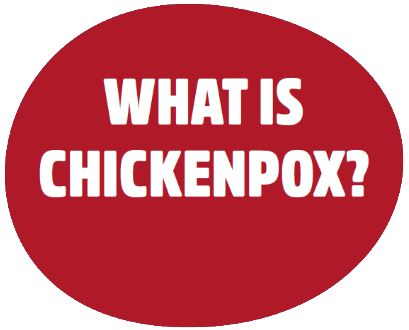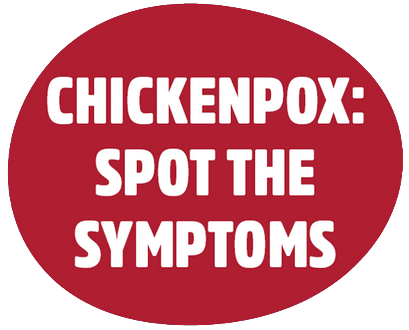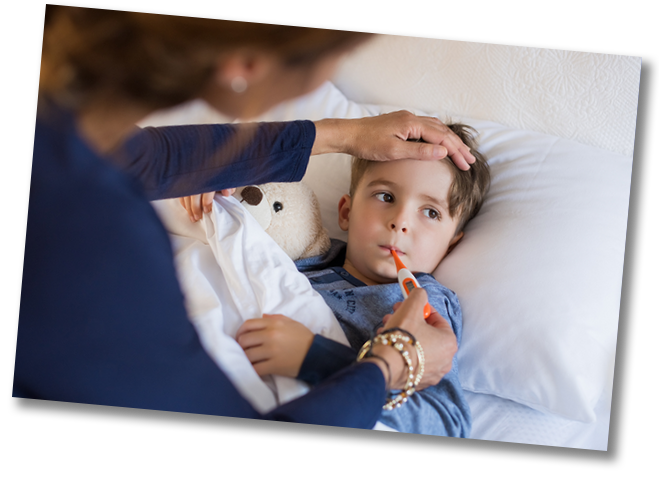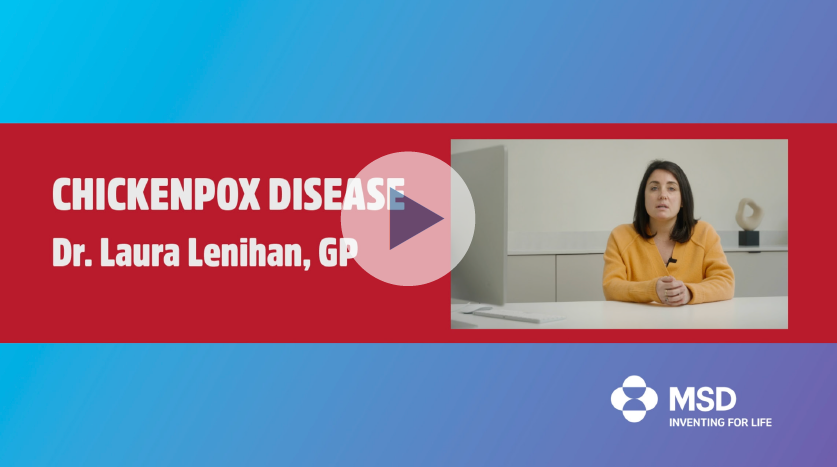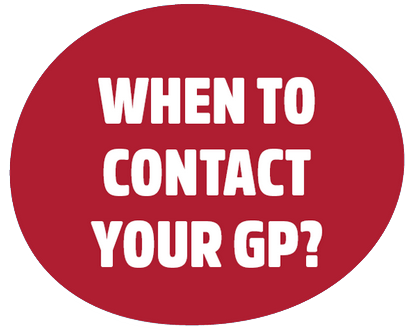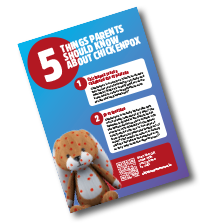WATCH AND LEARN
Share with:
CHICKENPOX: THE BASICS

The medical name for chickenpox is varicella because it is caused by the varicella zoster (VZ) virus.1 It’s a highly infectious disease.
It’s spread quickly and easily from someone who is infected.1 The good news is that, in most cases, once you’ve had it, your body is able to protect you from catching it again.2
SPOTTING CHICKENPOX / SYMPTOMS
Other diseases can cause rashes, so you shouldn’t simply assume it’s chickenpox.
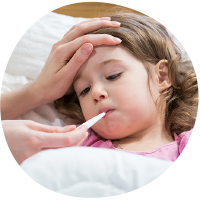
The illness usually starts with two to three days of fever, aches and pains and feeling out of sorts.3
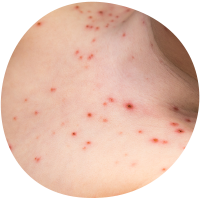
Then, an itchy, spotty rash develops, turning from spots to blisters to scabs and crusts.2 How many spots appear varies from person to person; some people hardly have any, while others are covered head to toe.3
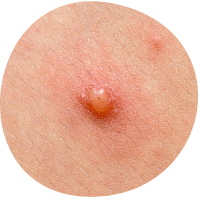
The infection is spread in the fluid found in chickenpox blisters and the droplets in the coughs or sneezes of someone with the infection.2
Chickenpox is contagious from 2 days before the spots appear, until they crust over. This takes about 5 to 7 days.2
DON’T PASS IT ON!
Because chickenpox is highly contagious, you should try to prevent spreading it by avoiding contact with others, particularly those at higher risk of complications such as pregnant women and people with weakened immune systems.2

That means no school, preschool or childcare until their spots are crusted over.2
A little one with chickenpox
will need around

so you may have to take time
off work to look after them.2
If you are due to take a flight, you may not be allowed to fly until the last blister has scabbed over, so check with the airline. If you are not contagious but the rash is still present, you may need a doctor’s certificate.2
BE AWARE OF HIGH RISK GROUPS
Chickenpox can occasionally lead to serious complications, especially in adults, pregnant women, newborn babies and people with weakened immune systems.2
People in these high-risk groups are more likely to experience complications such as secondary infections. For pregnant women, there is
a small risk of your baby being born with an illness. This risk increases if you get chickenpox when you are over 36 weeks pregnant.2
Post exposure prophylaxis with varicella antibodies is recommended in individuals who fulfill all the following three criteria3:
- Have had significant exposure to varicella or zoster
- Have a clinical condition that increases the risk of severe varicella (e.g.immunocompromised, pregnant women, neonates in the first week of life born to non-immune women, babies in Special Care Baby Units) and
- Are non-immune (no antibodies to VZ virus)
It’s important to seek medical advice if you are in one of these groups and think you may have chickenpox or recently been exposed to the varicella virus.2
POSSIBLE COMPLICATIONS
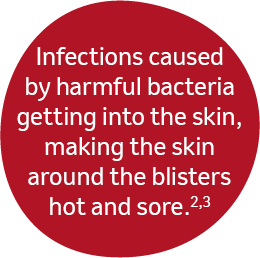
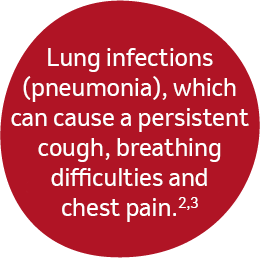
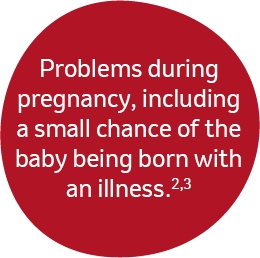
If you develop infections, you may need to contact a healthcare professional.2

There may not always be signs of chickenpox complications. However, you should look out for hot or painful skin, difficulty breathing or dehydration.2
If you see any possible signs of complications, contact your GP, Practice Nurse or Pharmacist immediately.2
If you have had chickenpox, you have a greater risk of developing shingles in later life. This can happen when the immune system is low and the chickenpox virus becomes reactivated. Though they are both caused by the same virus, chickenpox and shingles are different diseases.2
WHEN TO CONTACT YOUR GP
Chickenpox is usually mild and clears up in about a week. However, some people can become seriously ill and need to see a doctor.2

Contact your GP, Practice Nurse or Pharmacist if:2
- You think you have chickenpox.
- You get chickenpox as an adult. Adults have a higher risk of developing complications.
- You’re exposed to chickenpox while you’re pregnant.
- You think your child has chickenpox and they are under 1 month old.
- You’re exposed to chickenpox and have a weakened immune system.
- The skin around the chickenpox blisters is hot and sore.
- If your child is having trouble walking, very weak, and drowsy or hard to wake.
TREATING AND PREVENTING CHICKENPOX
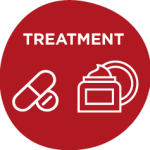
SPOTS, ITCHES AND TIME AT HOME
There is no cure for chickenpox and the virus usually clears up by itself without any treatment.2
Your pharmacist can advise about medicines that may help relieve itching or reduce pain and discomfort, but things will usually clear on their own after a few days. If complications develop, your doctor will decide on the appropriate treatment.2
If you need to book a doctor’s appointment, tell the receptionist that your child has chickenpox.
You may need to arrange a special appointment time to avoid infecting other patients.
Paracetamol is the preferred painkiller for treating the associated symptoms of chickenpox. This is due to a very small risk of non-steroidal anti-inflammatory drugs (NSAIDs), such as ibuprofen, causing adverse skin reactions during chickenpox.2,4
Never give your child aspirin if you suspect or know that they have chickenpox.2

Don’t scratch!
It can cause skin infections or permanent scarring. If your child can’t stop scratching, keep their fingernails short and put gloves or socks on their hands, especially at night.2

Speak to your pharmacist about using cooling creams or gels to relieve itching.2

Drink plenty of water to avoid dehydration.
Ice lollies are a good way of giving children fluids. They can also be soothing if your child has chickenpox spots in their mouth.2
More information about treating chickenpox can be found via the HSE website.
Need more information on chickenpox?
Talk to your doctor, nurse, or pharmacist about chickenpox today

Resources

Links
- NHS – https://www.nhsinform.scot/illnesses-and-conditions/infections-and-poisoning/chickenpox – Accessed Feb 2025
- HSE – https://www2.hse.ie/conditions/chickenpox/ – Accessed Feb 2025
- NIAC Guidelines. Chapter 23 – https://rcpi.access.preservica.com/uncategorized/IO_b07eb36b-663e-4ba1-a310-8104d8fda480/ – Accessed Feb 2025
- CDC. How to Treat Chickenpox – https://www.cdc.gov/chickenpox/treatment/index.html – Accessed Feb 2025
